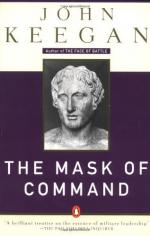
|
| Name: _________________________ | Period: ___________________ |
This test consists of 5 multiple choice questions, 5 short answer questions, and 10 short essay questions.
Multiple Choice Questions
1. The author says, "Few today think of Hitler as a soldier. But it was as a soldier, quite as much as a politician or ____________ - the strangest of his delusions - that he thought of himself" (p. 235).
(a) A dancer.
(b) An artist.
(c) A musician.
(d) An actor.
2. Included in Chapter Five are several photos and renderings of Grant, including a portrait and whose surrender at Vicksburg?
(a) Davis'.
(b) Lee's.
(c) Pemberton's.
(d) Jackson's.
3. While Grant may have been surrounded by more than his share of ordinary men, there were at least two that stood out to the commander. They were Lieutenant Colonel Rawlins, Assistant Adjutant General, and ________________, Aide de Camp.
(a) Captain Boon.
(b) Captain Bonneville.
(c) Captain Brooke.
(d) Captain Boners.
4. As a replacement for his presence, in what did Hitler engage?
(a) Propaganda.
(b) A strike.
(c) A television special.
(d) A film.
5. Chapter seven, "Grant the Fighter", recalls what?
(a) Grant's unchanging approach to battle.
(b) Grant's unique approach to battle.
(c) Grant's quiet approach to battle.
(d) Grant's strong approach to battle.
Short Answer Questions
1. Hitler was one of the most __________________ leaders of his or any other time.
2. The Battle of Shiloh was a surprise to the northerners. Why?
3. Grant, like many other commanders, was elected to head a recruiting committee for ___________.
4. Additionally, the men who were enlisted were mainly stationed on and around the __________________ River to protect trade and settlement routes.
5. Keegan compares West Point to the British ____________________ located in Woolwich and France's École de Génie at Mezières.
Short Essay Questions
1. Why was World War I called "the" war?
2. How was Hitler helped in his plan to destroy Poland?
3. What was Hitler's impact on and relationship with his soldiers?
4. Why was it suggested that Grant surrender at the Battle of Shiloh?
5. Why is Chapter Six, "Hitler in Command", possibly the most important chapter in this book?
6. What did Grant think about the reason for the Civil War? Do you agree? Why or why not?
7. What was the myth regarding Hitler's war-time lodgings? Was this myth true?
8. How did the results of World War I affect World War II?
9. Describe Hitler's early military experience.
10. Why might Grant not have wanted to surrender? What does this reveal about him?
|
This section contains 828 words (approx. 3 pages at 300 words per page) |

|




